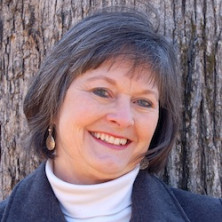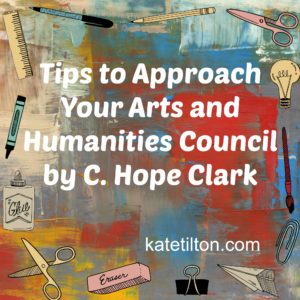Last month at PubSmart I had the great fortune of meeting C. Hope Clark, editor of FundsforWriters.com and author. C. Hope Clark is a woman of many talents and I learned a wealth of information from our time chatting. One of the new piece of knowledge I acquired was the arts and humanities council, something I had never heard about until this conference. Hope was kind enough to write about how to best approach these people to help your writing career. Read her tips below and be sure to check out FundsforWriters.com for even more helpful advice.
Arts and humanities commissions exist in every state, and smaller, more local councils exist in cities, counties and communities, all with the purpose of furthering the arts to the residents in their designated regions. In speaking to writer groups, I adamantly order them to locate these entities and connect. But most writers are unnerved and fearful in doing so.
First, they do not quite understand why they need these organizations, or why they exist.
What do these commissions do?
- They cultivate markets for artists.
- They enliven public places with promotion of the arts.
- They help artists with developing new entrepreneurial ideas.
- They support cultural events that incorporate the community.
- They recognize accomplished artists.
- They offer training to artists.
- They support school arts activities, incorporating artists.
- They help preserve cultural traditions.
All 50 states and the six U.S. jurisdictions (American Samoa, District of Columbia, Guam, Northern Marianas, Puerto Rico, and the U.S. Virgin Islands) have state arts agencies. They also have humanities commissions. It behooves you to check out both in your area to see which offers the most advantageous opportunities for you, your project, and your long-term goals.
No two states are alike, which means no two arts or humanities commissions offer the same assistance or have the same guidelines for artists. To find the ones that serve your area, see:
National Association of State Arts Agencies – http://www.nasaa-arts.org/
National Endowment for the Humanities – http://www.neh.gov/about/state-humanities-councils
You can learn who the smaller, more local entities are through these larger commissions. They know all the organizations in your state. Also, the next time you see a literary, humanities, or arts event in your community, drill down to the fine print and see where they acquired their funding. They are required to post their grant sources, and from there, you know who to visit and make inquiries as to what’s available for you, too. All of these groups are intertwined, helping artists and communities perpetuate the arts.
Now that you’ve identified who these folks are, here’s how you connect:
- Newsletter. Most of these commissions and councils have a blog or newsletter that gives their latest achievements as well as their deadlines, appearances, and training opportunities. Sign up for them. They list jobs, calls for submissions, contest deadlines and more.
- Visit. Make an appointment to meet with a grant or assistance specialist. It’s their role, and their job, to aid the arts, and that includes answering all those questions you think are silly, that are not. These people are easily accessible.
- Attend. Most of these entities hold town hall meetings, orientation nights, or information events. It’s part of their outreach duties. Attend one. Your eyes will be opened at not only what they have to offer, but also the real-life examples of successful artists who started just as you did, hunting for ways to make your art reality.
- Panel Volunteer. When grants are doled out, they are done so via a grant panel consisting of judges from many backgrounds. You may not think you qualify, but you would be amazed at the diversity they seek. They want judges with business, literary, educational, parenting and community development backgrounds. Creative sorts and logical minds. The commissions and councils will post calls for panelists, and the best way to learn how to write a grant, or learn how a grant is chosen, is to participate in the process. Step up!
- Event Volunteer. Being involved in another artistic event introduces you to those in the background, to include players in the commissions. Who you know works in all walks of life. And being devoted to the arts gives you a credible background in preparation for the moment you will need assistance. You’ll also learn how working in conjunction with others in the community, schools, government, nonprofits, and libraries can strengthen your ideas as well as your connections. When you need recommendation letters for your own grants, you’ll know exactly who to ask, and who will lend credibility to your project.
- Maintain Contact. If you aren’t sure if your project is fundable, pick up the phone or email. If you aren’t sure if your grant application is strong, send a draft and ask for help. If you need a mentor, give them a call. They are more than willing to assist.
The arts and humanities commissions, as well as the smaller, local arts councils, exist for the arts. That means you. You are not in this world alone, and neither are you alone in your writing efforts. Asking one question will lead to another. Meeting one person will direct you to others. The opportunities that open will dumbfound you, all because you decided to ask for help.
Get to know your arts and humanities commissions, and your local arts councils. Still not sure where to go? Simply Google <arts council AND your location> and see what pops up. It’s not hard.
About C. Hope Clark:
 C. Hope Clark is editor of FundsforWriters.com, an award-winning website that reaches 40K readers each weekend with its newsletters, and recognized by Writer’s Digest in its 101 Best Websites for Writers. She is also an awarding winning mystery novelist published by Bell Bridge Books. www.chopeclark.com
C. Hope Clark is editor of FundsforWriters.com, an award-winning website that reaches 40K readers each weekend with its newsletters, and recognized by Writer’s Digest in its 101 Best Websites for Writers. She is also an awarding winning mystery novelist published by Bell Bridge Books. www.chopeclark.com
Related articles









Article looks good! So happy to help educate your readers, Kate. And I thoroughly enjoyed meeting you in Charleston, SC. Hope we get to see each other there again!
Thank you for providing such a great article Hope! It was such a pleasure to be able to meet you at PubSmart and to get to know you. I am hoping we will see each other again soon!
Thank you for telling this to us. It’s good to combine art and humanities.
Yes! And knowing these people in your community is very helpful to authors & artists. 🙂